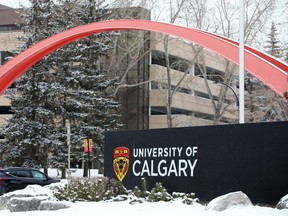The students lobbied the administration about the tuition increases and the struggle many students are experiencing to cover their living costs.

Article content
Students at the University of Calgary raised concerns about the school’s proposed tuition increases during a town hall with university administration Wednesday afternoon.
Announcement 2
Article content
If approved, most of the university’s undergraduate students would face a 5.5 percent increase in tuition costs, while nursing students would see an eight percent increase and most undergraduates internationals would see a 2 to 10 percent increase by the 2023-2024 school year.
Article content
Domestic graduate students would see a two to 5.5 percent increase and international graduate students would face a two to 10 percent increase, depending on the program.
Student service fees would also increase by 5.5 percent for all students.
A presentation by the university administration on the last day of classes this semester shows a $107.5 million cut in provincial grants from the 2018-2019 school year that continues to impact the budget.
Announcement 3
Article content
The cut brings the grant to the same size as it was 10 years ago when the school had 3,000 fewer students and 1,500 fewer employees, said Ron Kim, the university’s vice president of finance and chief financial officer.
The university administration brought rising inflation into the discussion, noting that operating costs continue to rise.
Students press university administration
During the town hall question and answer period, students lobbied the administration about tuition increases and the struggle many students are experiencing to cover their living costs.
A Law School student said that the town hall is not an acceptable dialogue between students and university administration when tuition increases have such a severe impact on students.
Announcement 4
Article content
“The reality is that this institution doesn’t care,” said the student. “I’m sorry to break it to you, but we have two-thirds of the students on campus who are food insecure and nothing has been done about it at the institutional level. We cannot solve a systemic problem with individual action.”
The students present at the event on campus clapped in agreement.
Another student asked why the burden of cutting government grants falls on students when graduate students contribute hundreds of millions of dollars in research funding.
“How can we be sure that the funds we are providing will go back to all graduate students?” asked the student.
Penny Werthnur, interim provost and academic vice president, explained the myriad of scholarships and grants available to students based on merit and need.
Announcement 5
Article content
“We continue to increase them because we know that helps you complete your education as a graduate student, in a timely manner,” Werthnur said.
A student from the nursing program asked why nursing students are facing a bigger increase than other programs after they were already hit with a 10 percent increase for this term.
The maximum national tuition increase per program is 10 percent.
The administration said the increases are intended to bring the costs of the University of Calgary nursing program back in line with the price of nursing programs across the country.
-
U of C pushes vote on tuition hike after student union yells lack
-
Cash-strapped U of C students seek alternatives to pricey textbooks
-
UCalgary welcomes record number of students to on-campus housing amid COVID uptick and tight rental market
-
Large tuition increases approved for several U of C programs
The university postponed its discussions on the proposed tuition increase at the request of the student union, after the union claimed that the school administration had refused to allow proper consultation with students.
Announcement 6
Article content
In a statement to Postmedia, UB President Nicole Schmidt said the “hastily organized town hall” only happened because of rejection by the union.
“This should have happened in the first place,” Schmidt said.
She said that between the in-person event and the live stream, more than 200 students turned out for town hall even though it was exam season.
“The university must do the right thing and further delay its tuition vote until students can be meaningfully consulted and the university meets its obligations under provincial tuition regulations,” the president said.
After hearing student feedback by December 5, the university opted to reduce the proposed nursing tuition increase from 10 percent to 8 percent. Dino Athletics and active living fees that are associated with tuition costs have also been reduced from a possible seven percent increase to a 5.5 percent increase.
“We are committed to reviewing the mandatory non-educational fee reporting process in the future and are committed to a review of student wellness services to improve that alignment with student priorities,” Werthnur said.
Students can provide feedback to the university for the remainder of the week.





